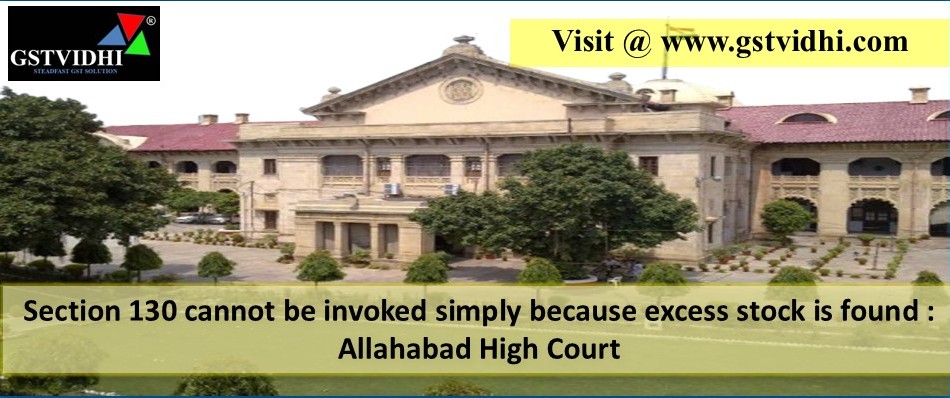
Section 130 cannot be invoked simply because excess stock is
found : Allahabad High Court
Background
of the Case
M/s Magma Industries, a
public limited company engaged in the manufacture and sale of bulk drugs used
in pharmaceuticals, faced GST proceedings following a survey conducted on
28.01.2021 at its business premises. During the survey, officials claimed
that excess stock was found—based only on eye estimation, without
any physical weighment.
Relying on this visual
estimation, the department initiated proceedings under Section 130 of
the GST Act (which deals with confiscation and penalty), and issued an order
dated 20.07.2021 through the Deputy Commissioner. The appeal filed by
the company was rejected on 31.05.2022 by the Additional Commissioner.
The company challenged both orders before the Allahabad High Court.
·
M/s Magma Industries v. Additional
Commissioner Grade 2 & Others
· Court:
High Court of Judicature at Allahabad
· Case
No.:
Writ Tax No. 1179 of 2022
· Order
Date: 28 July 2025
Petitioner’s
Submissions
Counsel: Mr. Suyash
Agarwal The petitioner contended that:
- The entire survey and stock
verification were conducted without actual weighment—only rough
visual estimates were used.
- The authorities should have invoked Section
73 or 74 (for determination of tax not paid or short paid) instead of
jumping to Section 130, which is meant for serious offences
involving intent to evade tax.
- There was no allegation or proof
that the company intended to evade taxes.
- The case was covered by earlier
rulings like:
- Vijay Trading Company v. Addl.
Commissioner
- Dinesh Kumar Pradeep Kumar
- Maa Mahamaya Alloys Pvt. Ltd.
- Metenere Limited
- These rulings, affirmed by the
Supreme Court, clearly held that Section 130 cannot be invoked simply
because excess stock is found.
Respondent’s
Submissions
Counsel: Mr. Ravi Shanker
Pandey, Additional Chief Standing Counsel
The State defended the impugned orders, stating that the presence of
unaccounted stock justified invoking Section 130 of the GST Act.
Court’s
Observations
The Court reviewed the
facts and relevant legal precedents and made the following key observations:
- It was not in dispute that the
survey took place and excess stock was claimed to be found.
- However, the method of stock
determination was flawed, as no physical weighment was done—only
visual estimation.
- The Court reiterated that even if
excess stock is found: Proceedings must be initiated under Sections 73
or 74, not Section 130.”
- The Court relied on earlier landmark
rulings, especially Metenere Ltd., which clarified:
- Section 130 involves confiscation
and is triggered only where there is clear intent to evade tax.
- The mere existence of unaccounted
goods does not justify invoking Section 130.
- The tax liability for such
unaccounted goods must be determined using the assessment process under Sections
73 or 74, and not through summary penal action.
Final
Judgment
The High Court concluded
that the department's action was legally unsustainable, and held:
“The impugned orders
dated 20.07.2021 and 31.05.2022 are hereby quashed.”
Accordingly:
- The writ petition was allowed.
- Both the assessment and appellate
orders were set aside.
Conclusion
This judgment reinforces
the principle that Section 130 of the GST Act cannot be misused for
penalizing businesses based on estimated excess stock without proof of tax
evasion. Any tax liability arising from discrepancies must follow due process
through proper assessment under Sections 73 or 74.
This case is a key
precedent for taxpayers facing aggressive departmental actions based on
surveys, and upholds the right to fair and lawful tax determination
procedures.
Disclaimer: All the Information is based on the notification, circular advisory and order issued by the Govt. authority and judgement delivered by the court or the authority information is strictly for educational purposes and on the basis of our best understanding of laws & not binding on anyone.
Press On Click Here To Download Order File
Click here